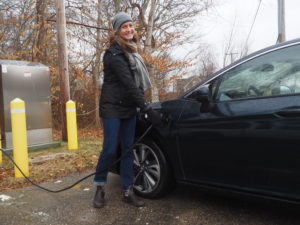Stephanie Madsen pulls up to a charging station in a parking lot at Woods Hole Oceanographic Institution and plugs the charging cable into her electric car. She’s one of 20 WHOI employees who are registered to use the organization’s four charging stations, located on the WHOI Quissett and Woods Hole Village campuses. Two of those charging stations were largely funded by a program launched last year by Eversource.
With its Electric Vehicle (EV) Charging Station initiative, Eversource has so far established partnerships with more than 45 non-profits, municipalities, mid-size and large businesses to install 166 charging stations.
As part of its effort to be carbon neutral by 2030, Eversource has budgeted $45 million to enable 3,500 such ports. So far, 11 sites are up and running on the Cape, and there many on Plymouth as well, reports James Cater, Program Lead, EV Infrastructure, at Eversource.
Under the program, Eversource pays for the total cost of bringing power from the transformer to the charging station. That cost varies widely, depending on the distance to be trenched and site conditions, but can be as high as $50,000 or $100,000. Eversource also provides the electrical distribution cabinet, with meter, external shut-off, and breakers. According to Eversource, that investment represents 50 to 90 percent of the costs associated with installing EV charging stations.
According to Eversource, adding such practical and sustainable perks make it easier for employees to be green and align with corporate responsibility goals.
That’s what motivated Woods Hole Oceanographic Institution, says Madsen, who is the institution’s sustainability coordinator. Expanding the institution’s charging capability from two stations to four wouldn’t have been possible without a program offered by Eversource, she says.
“It definitely works for us because we want to walk the walk, and we want our employees to feel empowered about taking action on climate change. Our philosophy is if we build it they will come,” explains Madsen.
Eversource estimates that cost to the customer for a dual port charging station ranges between $5,000 and $7,000. Customers pay for installation, approximately $1,000, plus cloud-based networking fees, which allow for drivers to pay for their electricity with the swipe of a card.
Madsen says the charging stations cost her organization about $6,000 each. In addition to the electricity used, Eversource charges a service fee of $75 per month per station, plus other fees and taxes. In addition to that, WHOI pays $240 per year per station for the cellular connection needed for the pay system.
To offset the expense, WHOI charges $1 per hour for charging.
“We want to encourage our employees to drive electric vehicles to reduce our carbon footprint. It’s super easy,” says Madsen.
Madsen notes that there are also U.S. Department of Energy grants of 60 percent to offset the cost of charging stations.

As more people begin to use the system, WHOI will break even, predicts Madsen.
“I think it’s been super positive,” she says.
Each distribution cabinet can support five charging stations, or ten ports, which can be added over time.
The goal is to accelerate the deployment of electric vehicles, explains Cater. One of the chief reasons people don’t buy electric cars is the fear that they won’t have a place to charge them.
It’s called range anxiety, the fear of running out of juice before you reach your destination.
The Massachusetts Department of Environmental Protection has set a goal of having 300,000 electric cars on the road by 2025. That goal won’t be easy to achieve without plenty of charging stations.
“Given that adoption rate there needs to be quick deployment of charging stations throughout the Commonwealth. By the end of the program, we will have enabled at least 3,500 charging ports. It’s a significant number,” says Cater.
“We continue to get strong demand from all of our customers who are very interested in participating in the program, cities and towns as well as businesses, hotels, retail sites, who see it as a way to attract customers,” says Cater.
According to the company, in addition to installing onsite EV charging stations, some Eversource customers have offered their employees financial incentives to support the switch to electric vehicles.
Cape Air offers employees a $1,000 rebate towards the purchase of an EV, and employees who charge at work get free charging until the end of 2020.
Since installing charging stations in July, 2019, and implementing the incentive program, the number of Cape Air employees with EVs has increased from none to nine. Mass Audubon has seen similar trends after installing EV charging stations.
“We feel that our Electric Vehicle Incentive Program is green in two ways: it is helping our employees in their pocketbooks, and it is good for all of us in terms of lowering carbon emissions,” said Cape Air Director of Sustainability Jim Wolf.
Madsen cautions that the Eversource program isn’t for everyone, especially organizations where there aren’t enough users to cover the monthly fees associated with the systems. A small business, with few employees, might consider hiring an electrical contractor to do the wiring and install a simple charging station, which costs about $600. It won’t have a pay system and separate electricity service, but won’t have the costs associated with them either.

























